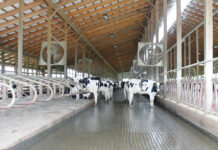All of agriculture recognizes the risk of agricultural surface water pollution in a heavily farmed area. New research at Ohio State found, however, that the land that is not in farms in a community downstream of farmland – mostly developed land – has more of an impact on water treatment costs than farmland.
The OSU study looked at costs at 11 water treatment plants in the Maumee River basin in northwestern Ohio, as well as the impact of farming practices and land use on these costs.
Switching to no-till was the big money saver for these downstream plants. According to ag economist Lynn Forster, a 10 percent decrease in the amount of conventional tillage lessened “water turbidity” (currents carrying sediment) by 13 percent and ultimately reduced the average plant’s chemical costs by $6,750 annually.
A 10 percent drop in upstream pesticide application translated into an annual savings of about $4,500 by the average water treatment plant.
Forster’s findings, however, showed the biggest increase in costs came from land not in farms.
A 10 percent decrease in nonfarmland in a watershed created an estimated 20 percent increase in turbidity and increased the water treatment costs by $10,000 at the average plant.
Any time we pave over land, we impact water flow, erosion and natural resources conservation. Agriculture is working to reduce its environmental impact; what about the rest of the land users?
Who gets Fido? In certainly the weirdest twist of divorce proceedings we’ve heard yet, according to a news piece on ABC.com, the Animal Legal Defense Fund says it is getting involved in “custody battles over pets.”
The article says, “The fund has been submitting legal briefs to the courts, suggesting that judges look at the case in terms of the animal’s interest.”
And commenting on the guardianship of a chimp from a California wildlife sanctuary, Steven Wise, a lecturer of animal law at Vermont Law School and Tufts University School of Veterinary Medicine, offers this wisdom: “Any animal – at least one with a sense of self – should become eligible for legal rights.”
The article says Wise is drafting a “declaration of rights for apes, which he hopes international leaders will sign by the year 2010.”
True animal lovers should be able to recognize what’s right for a pet cat or a rescued chimp without involving high-priced lawyers and tying up our courts. Animal abuse is already covered under the law, is someone going to tell me that feeding my dogs only once a day is “unjustified suffering” and I’m an unfit dog owner?
Animal welfare is one thing; animal rights is another. It would be a wiser world if everyone could distinguish between the two.









